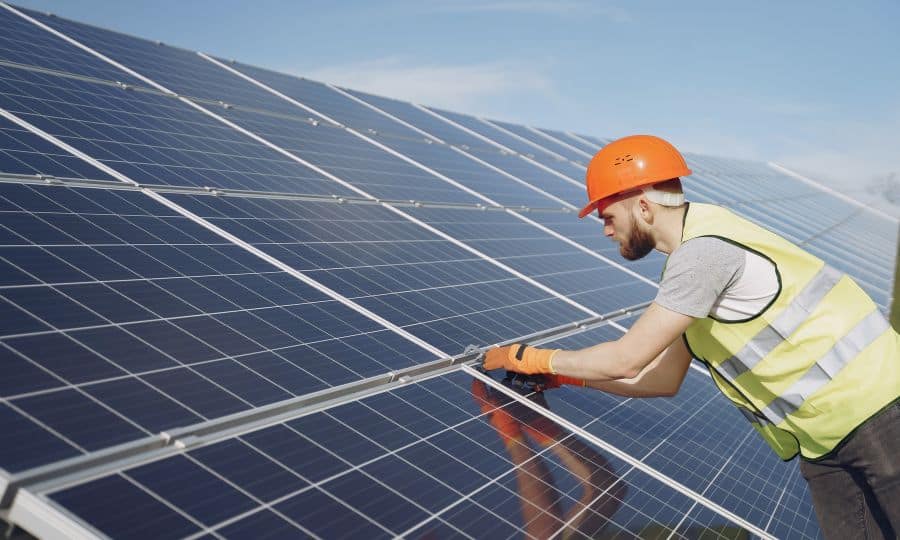Can You Have A Power Outage With Solar?
Did you know that more than 3 million solar installations exist in the U.S.?
A long-term power outage is nothing new in the United States. Over the past ten years, tropical storms have resulted in between five and 13 blackouts per year.
While covering for the power grid failure has been difficult for utilities, protecting their customers has been more challenging. If you’re considering going solar, you may wonder if a blackout would affect your system.
So, can you have a power outage with solar? Keep reading to find out.

Table of Contents
If You Have Grid-tied Solar System
You can have a power outage if you have a grid-tied solar system. This is to avoid injury to utility workers. If the power goes out for any reason, your solar panels will also be shut down.
The system will be automatically shut down when a power outage occurs. Power generated by solar panels will be lost since it is not being sent to the grid.
You should supply your home’s electricity needs with a backup power generator. They will be able to charge while the grid is down. With these solutions, you are ensured of power supply even when the grid goes out.
Having A System Overload
Having a system overload can cause power outages with solar systems. The electrical draw overwhelms the system, so it can’t adequately direct that energy to where it’s needed.
System overloads usually occur in homes with inefficient panel orientation and wire placement or when extra heavy loads are placed on the solar system. For example, suppose more air conditioners and other electric appliances are put onto a solar system than it can handle. In that case, the solar system might become overloaded, leading to a power outage.
When There Is A Battery Failure
A power outage with solar can occur when there is a battery failure. Though solar power systems are self-contained, any stored energy has to be securely stored. A battery failure can result in the system being unable to store any extra electricity generated. This leads to power outages.
Even with a reliable battery, solar panels cannot store enough electricity to power a home during a power outage. They will draw power from the grid to supplement what they generate. This backup from the grid needs to be in place.
If it is not replaced, your solar power system will be unable to supply the power needed. Therefore, it is essential to maintain your solar battery to provide power during a power outage.
If You Have A Faulty Equipment
Yes, you can have a power outage with solar energy if you have faulty equipment. A solar power system allows sun rays to enter solar cells that convert the sunlight into electricity. If faulty equipment is faulty, it can prevent the system from operating optimally.
It will eventually cause blackouts. Equipment failure can affect the quality of the energy generated. This results in a power outage. It is essential to maintain the solar energy system regularly.
This will help ensure it continues generating energy with no breakdowns or power outages. It is also necessary to be vigilant in noting any changes due to faulty equipment or wear and tear on the system.
When Affected By Weather-related Events
Solar energy relies on an uninterrupted flow of sunlight, and a severe weather event can obstruct that flow, resulting in the unavailability of power from the solar cells. Power outages caused by solar energy are possible, although rare. The most common weather-related event to cause a power outage is a snowstorm.
When heavy snow accumulates on the solar array and stops light from reaching the cells, the system cannot produce energy. In addition, a significant thunderstorm or hurricane can cause power outages by disrupting the electrical flow from the cells.
Lightning and wind can prove disruptive to electrical systems and create a power outage in a solar system. Although solar power outages caused by weather-related events are rare, it is essential to ensure that solar systems are adequately insulated, protected, and regularly inspected to reduce the chances of experiencing a power outage.
Concerns With Solar Panel Shading
Shading can majorly cause power losses on a solar panel array. As solar panels need unrestricted access to sunlight to perform optimally, even small amounts of shade can cause significant reductions in power output.
Various factors, such as trees, buildings, or nearby objects like power poles and chimneys, can cause shading. To prevent power outages caused by shading, it is essential to map out any nearby sources of shading that may affect the solar panels.
Additionally, it is essential to use solar panels with the highest efficiency rating possible to maximize the system’s yield and give it some wiggle room in the event of shading. The best way to ensure a power outage-free experience with solar is to install appropriately-sized systems and use careful placement and design to avoid shading sources.
When Affected By Maintenance Issues
Solar panels are still subject to the same environmental conditions and wear-and-tear issues as conventional electricity sources. This includes snow, ice, storms, and even the buildup of dust particles, which can all interfere with the effectiveness of the solar panels.
In addition, regular maintenance is necessary to keep the system operating correctly, including cleaning the panels, replacing worn parts, and checking connections. Maintenance issues can cause a power outage if the problem is not addressed quickly and adequately.
Regular maintenance can help prevent a power outage and ensure that the system is running at optimal performance. You can enjoy the benefits of clean energy and a reliable power source with proper maintenance and responsible energy usage.
Avoiding Power Outage With Solar Energy
Power outages can happen with solar energy if the system is not managed correctly. To avoid power outage, solar energy users should research and carefully plan out their strategies to ensure they are prepared for any potential power outage. A quality solar panel power system can help you stay powered, even during an outage.
If you are interested in more, visit our website and read more.


